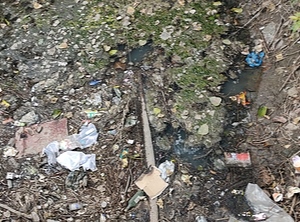INDIA
Launch of Plastics Pact by WWF, CII / Packaging targets to be achieved by 2030
 Plastic waste strewn on the streets of New Delhi / India (Photo: PIE) |
After planning to ban single-use plastics (SUP) by 2022 (see Plasteurope.com of 14.04.2021), India has now launched the India Plastics Pact, a joint initiative by the World Wide Fund for Nature, India (WWF, New Delhi; www.wwfindia.org) and the Confederation of Indian Industry (CII, New Delhi; www.cii.in). The pact aims to bring together leading businesses to make commitments for a circular system for plastics.
The Indian initiative is not part of Ellen MacArthur Foundation’s (EMF, Cowes / UK; www.ellenmacarthurfoundation.org) global plastics pact, which was launched in 2018 to exchange learning and best practices to accelerate the transition to a circular economy. It is, however, supported by UK Research & Innovation (UKRI; Swindon; www.ukri.org), a non-governmental support organisation, and Waste and Resources Action Programme (Wrap, Banbury; www.wrap.org.uk), a global NGO based in the UK.
According to WWF India, the country generates 9.46m t of plastic waste every year, of which 40% is not collected. About half of all plastics produced in the country are used in packaging, most of which is single-use in nature. Commitments made under the new pact aim to keep plastic packaging in the economy and out of the environment. The scheme has set four targets to be achieved by 2030:
The Indian initiative is not part of Ellen MacArthur Foundation’s (EMF, Cowes / UK; www.ellenmacarthurfoundation.org) global plastics pact, which was launched in 2018 to exchange learning and best practices to accelerate the transition to a circular economy. It is, however, supported by UK Research & Innovation (UKRI; Swindon; www.ukri.org), a non-governmental support organisation, and Waste and Resources Action Programme (Wrap, Banbury; www.wrap.org.uk), a global NGO based in the UK.
According to WWF India, the country generates 9.46m t of plastic waste every year, of which 40% is not collected. About half of all plastics produced in the country are used in packaging, most of which is single-use in nature. Commitments made under the new pact aim to keep plastic packaging in the economy and out of the environment. The scheme has set four targets to be achieved by 2030:
- Define a list of unnecessary or problematic plastic packaging and items, and take measures to address them through redesign and innovation.
- Reuse or recycle 100% of plastic packaging.
- Effectively recycle 50% of plastic packaging.
- Incorporate 25% average recycled content across all plastic packaging.
09.09.2021 Plasteurope.com [248534-0]
Published on 09.09.2021
